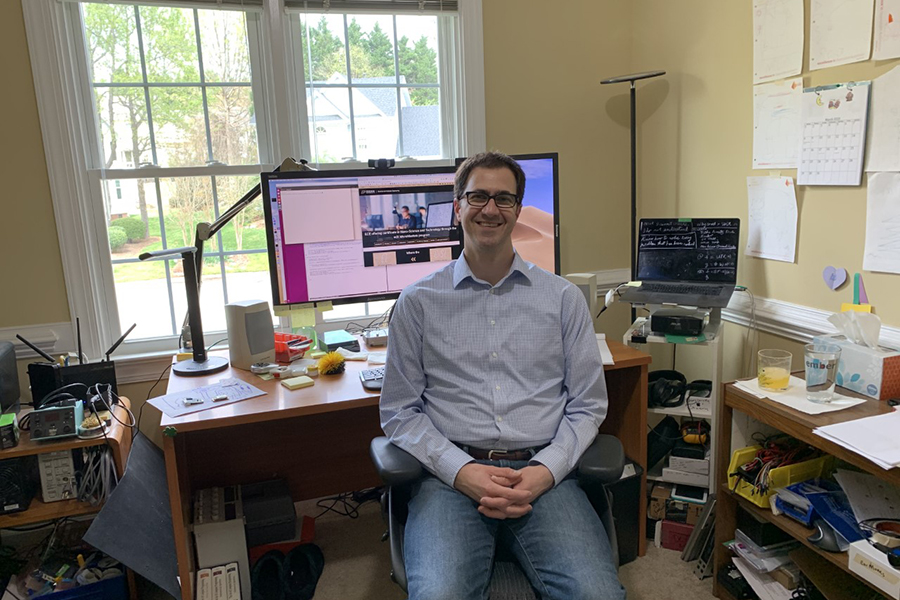ECE alumnus delivers virtual talk for students

As Purdue faculty, staff, and students adjust to remote working, teaching, and learning, ECE alumnus Christopher Svec led a virtual talk to give tips and advice based on his experience. More than 100 students participated in the virtual talk, which took place via Zoom.
Svec (BSEE ’99, MSECE ’02) is currently a software engineering manager at iRobot and leads the embedded software team for the Roomba vacuuming and mopping robots. He has been with iRobot for six years, and has worked remotely for the last five.
Svec says for those who have never done it before, it will take time and practice to adjust to working and taking classes from home.
“These are unprecedented times. It’s ok to be scared or anxious about your health, your schooling, your family,” says Svec. “And it’s good to express those feelings to friends and family.”
Svec suggests setting up a daily routine and developing a habit of following that routine, whether you feel like it or not. He reminds students that this is likely the first time many of their professors have had to teach in this manner.
“Have patience with yourself and those around you,” says Svec. “You’re going to get frustrated and stressed. It’s ok. If you can make a routine it will get easier over time.”
He suggests students give professors constructive feedback about how remote learning is going. Svec also offered these tips for successfully working and learning from home:
- Accountability: Telling people what your schedule is will help you stick to it. Maybe sync up with a friend or two virtually and do some work together. If you know someone is waiting for you, you’re much more likely to show up.
- Repeatability: Mark days down on a calendar for every day you keep to your routine. This will be visual motivation to keep to this routine on days when you don’t want to.
- Control: Focus on what you can control — when you work, where you work, how you work, and your attitude about your situation.
Svec says students can look at the rest of this semester as an opportunity to get better at learning and working remotely.
“Employers want people who they can give a problem to and that person can go off on their own and figure it out,” says Svec. “You have the opportunity now to challenge yourself and learn how to accomplish tasks on your own.”
He says students who take advantage of this opportunity will come out of this with more marketable skills.
“Your career is going to be about 40 years long,” says Svec. “Guaranteed in that time there will be 40 new technologies that come out. The more you get used to learning how to learn now, especially on your own, the better it’s going to serve you for the rest of your career, whether you end up working remotely or not.”
Svec says if your summer internship falls through because of coronavirus restrictions or related reasons, there are still things you can do to build your resume.
“I would recommend picking a small project that requires you to learn something,” he says. “Whether it’s an electronic gadget or building a website or learn some technology, do something where you can set a goal and achieve that goal while learning something new along the way.”
Svec says this would show a potential employer initiative, discipline, and the ability to get a project done.
Svec has more than fifteen years of software and hardware design expertise and leadership. He has worked in a wide variety of embedded systems including mass-produced consumer products and large-scale mesh networking chips. He started his career designing x86 chips and later moved up the hardware/software stack into embedded software.
Svec is passionate about improving technology as well as sociology and psychology. He believes that building something well depends on how people work together to build it. Svec thinks that empathy is a key differentiator in successful engineering projects.
